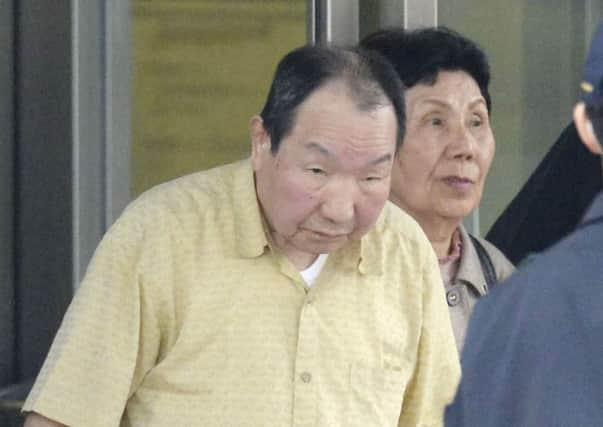Taste of freedom after 45 years on death row


The world’s longest-serving death-row prisoner has been freed, after a court found investigators had probably fabricated evidence in the murder case that put him behind bars for nearly half a century.
The Shizuoka district court in Japan suspended the death sentence and ordered a retrial for 78-year-old Iwao Hakamada, who was convicted of the 1966 murder of a family and sentenced to death in 1968.
Advertisement
Hide AdAdvertisement
Hide AdMore than 45 of his 48 years in prison have been on death row, making him the longest-serving such inmate, according to Guinness World Records.
Mr Hakamada walked out of the Tokyo Detention Centre, escorted by his sister, as dozens of journalists and supporters waited outside. He looked briefly at the crowd and got into a car without speaking, although his sister addressed the media.
Hideko, 81, who devoted more than half her life to the legal battle on her brother’s behalf, said she was happy he was finally free. “I just want to praise him for enduring all these years,” she said. “Forty-seven years is an awfully long time.”
Mr Hakamada was not executed because of a lengthy appeals process. It took 27 years for the Supreme Court to deny his first plea for a retrial. He filed a second appeal in 2008, and the court finally ruled in his favour yesterday.
“It is unbearably unjust to prolong detention of the defendant any further,” judge Hiroaki Murayama said. “The possibility of his innocence has become clear to a respectable degree.”
Mr Hakamada was convicted of killing a company manager and his family and setting fire to their home, where he was a live-in employee.
The court said a DNA analysis obtained by his lawyers had suggested investigators had fabricated evidence.
Blood stains detected on five pieces of clothing, which investigators said were worn by the culprit during the crime, did not match Mr Hakamada’s DNA, and trousers that prosecutors submitted as evidence were too small for him and did not fit when he tried them on.
Advertisement
Hide AdAdvertisement
Hide AdThe court’s order makes Mr Hakamada only the sixth death-row inmate to get a retrial in Japan’s history of post-Second World War criminal justice.
“We finally tore down the wall,” said defence solicitor Katsuhiko Nishijima. “We will challenge the court decisions, as well as police and prosecutors that have denied our appeals so many times.”
Yesterday’s ruling underscores Japan’s much-criticised closed interrogations without a lawyer, which rely heavily on self-confession. Mr Hakamada confessed after a closed interrogation that lasted 20 days.
Following criticism that Japan’s lengthy court proceedings violate defendants’ right to a fair and speedy trial, the country has increased the number of judges to speed up the process, while adding some transparency, including a jury system.
The United Nations’ torture committee said in 2013 that Japan’s routine interrogation of suspects in police custody, known as “substitute prison,” often resulted in beating, intimidation and sleep deprivation.
Justice authorities are discussing videotaping interrogations, but only partial recordings are being tested.
Japan is highly secretive about executions. Death row inmates are informed the morning they are hanged. More than 100 people are on death row, in solitary confinement, and some of them have been there for years.